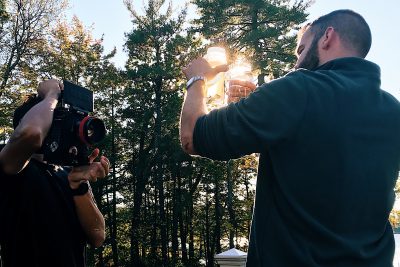


According to recent research by Massachusetts Institute of Technology (MIT), by 2025, over half of the world’s population will reside in water-stressed areas. And quite shockingly, approximately a billion more will have insufficient access to adequate water resources.
What is being done to address these troubling statistics? And who has a long-term solution? Step forward Aaron Steeves, IMBA alumni from Boston, Massachusetts, who believes his prototype greywater treatment system could revolutionize how we conserve and recycle water.
In 2016, Aaron took this idea with him to the International School of Management in Paris, where it became the focus of his IMBA project. Over time, his original vision evolved – inspired by conversations with his classmates and the diverse experiences and cultural perspectives they offered. Aaron decided that in the strict confines of his parents’ basement, he was to create a prototype closed-loop greywater treatment system. His aim is simple: develop a compact, affordable and easily implementable means of conserving and recycling urban household wastewater into water fit for human consumption.
“The first step in any purification system is to rip apart your parents’ plumbing,” Aaron says. Indeed, while not the first place you might think to construct a greywater purification system, the bowels of Aaron’s family home proved the perfect incubation space for his ideas. Given the indisputable benefits of his invention, however, it was clear he would not be confined to his parents’ basement for long.
His progress has picked up interest from several commercial retailers, as well as NGOs and charities.
Changing our relationship with water and how we conserve it can have enormous benefit for millions of people around the globe today. Demand for water is already putting a strain on the supply and this is set to continue, with some projections suggesting a 55% increase between 2000-2050.
In Australia, the ‘millennium drought’ of 1997-2010 forced the government to introduce strict water conservation measures. Some dry countries, including Israel and the Gulf states, have even turned to desalinization: the recycling of salt water as a stop-gap means of meeting water needs. The problem with both approaches is that they are either costly or they limit human activity in some way.
This is where Aaron Steeves hopes his prototype can lead the way and transform how we as a human race conserve water. What started as a bold and ambitious student project could, he believes, become one of the most viable and cost-effective means we have to conserve and sanitize greywater into safe drinking water. And he hopes it could one day create a lasting shift in how society views and uses water.